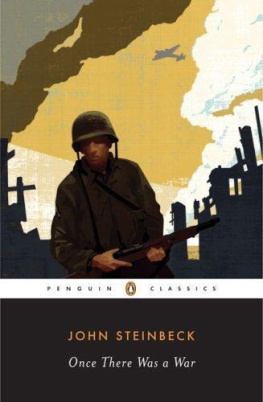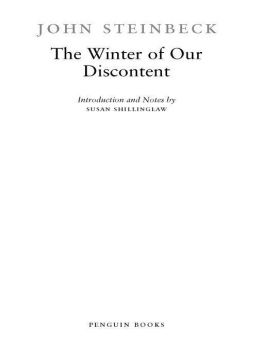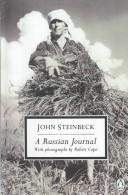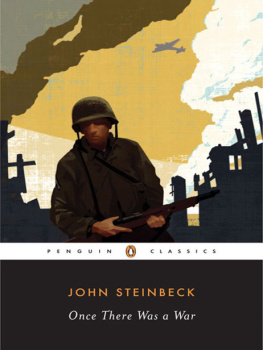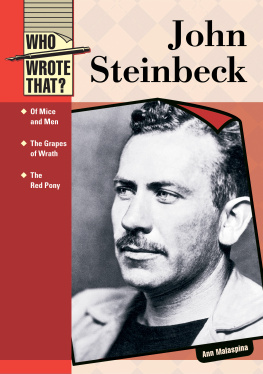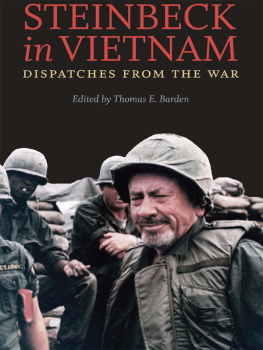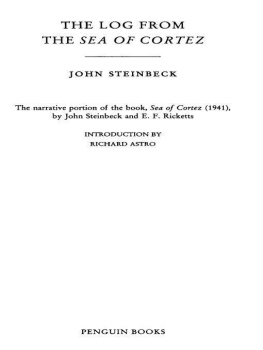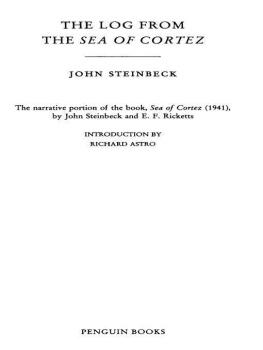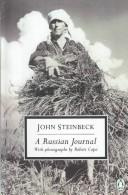THE WAY
IT WAS
THE LIEUTENANTWALKED SLOWLY
up the hilltoward the German positions.
He carried hiswhite flag over his head,
and his whiteflag was a bath towel.
Last night whenhe had argued for the
privilege ofgoing up and trying to kid
the Jerry intosurrender he hadnt known it
would be likethis. He hadnt known
how lonely andexposed he would be.
The lieutenantknew that if he were hit and
not killed hewould hear the shot after
he was hit, butif he were hit in the
head he wouldnthear or feel
anything. Hehoped, if it happened, it
would happen thatway ...
One of theUnforgettable Stories John
Steinbeck Tells in OnceThere Was a War
Books by John Steinbeck
CUP OF GOLD
THE PASTURES OF HEAVEN
TO A GOD UNKNOWN
TORTILLA FLAT
OF MICE AND MEN
THE RED PONY
THE GRAPES OF WRATH
CANNERY ROW
THE WAYWARD BUS
THE PEARL
BURNING BRIGHT
EAST OF EDEN
SWEET THURSDAY
THE SHORT REIGN OF PIPPIN IV
Published by BantamBooks
ONCE THERE
WAS A WAR
by
JOHN STEINBECK
Bantam Books New York
THIS LOW-PRICED BANTAM BOOK
printedin completely new type, especially designed for easy reading, contains thecomplete text of the original, hard-cover edition. NOT ONE WORD HAS BEENOMITTED.
ONCE THERE WAS A WAR
A Bantam Book / published by arrangement with
The Viking Press, Inc.
PRINTING HISTORY
Viking edition published September 1958
Books Abridged edition published March 1959
Serialized the NEWYORK HERALD TRIBUNE Syndicate
June-December 1943
Bantam edition published January 1960
All rights reserved
Copyright 1943, 1958, by John Steinbeck
Published simultaneously in the United States andCanada
BantamBooks are published by Bantam Books, Inc. Its trade-mark, consisting of thewords Bantam Books and the portrayal of a bantam, is registered in the U. S.Patent Office and in other countries. Marca Registrada. Printed in the UnitedStates of America. Bantam Books, Inc., 25 West 45th St., New York 36, N. Y.
Contents
Introduction
ONCE THERE WAS A WAR: AN INTRODUCTION
ONCE UPON A TIME there was a war, but so long ago and soshouldered out of the way by other wars and other kinds of wars that evenpeople who were there are apt to forget. This war that I speak of came afterthe plate armor and longbows of Crcy and Agincourt and just before the littlespitting experimental atom bombs of Hiroshima and Nagasaki.
I attended a part of that war, you might sayvisited it, since I went in the costume of a war correspondent and certainlydid not fight, and it is interesting to me that I do not remember very muchabout it. Reading these old reports sent in with excitement at the time bringsback images and emotions completely lost.
Perhaps it is right or even necessary to forgetaccidents, and wars are surely accidents to which our species seems prone. Ifwe could learn from our accidents it might be well to keep the memories alive,but we do not learn. In ancient Greece it was said that there had to be a warat least every twenty years because every generation of men had to know what itwas like. With us, we must forget, or we could never indulge in the murderousnonsense again.
The war I speak of, however, may be memorablebecause it was the last of its kind. Our Civil War has been called the last ofthe gentlemens wars, and the so-called Second World War was surely the lastof the long global wars. The next war, if we are so stupid as to let it happen,will be the last of any kind. There will be no one left to remember anything.And if that is how stupid we are, we do not, in a biologic sense, deservesurvival. Many other species have disappeared from the earth through errors in mutationaljudgment. There is no reason to suppose that we are immune from the immutablelaw of nature which says that over-armament, over-ornamentation, and, in mostcases, over-integration are symptoms of coming extinction. Mark Twain in AConnecticut Yankee uses the horrifying and possible paradox of the victorsbeing killed by the weight of the vanquished dead.
But all this is conjecture, no matter howpossible it may be. The strange thing is that my dim-remembered war has becomeas hazy as conjecture. My friend Jack Wagner was in the First World War. Hisbrother Max was in the Second World War. Jack, in possessive defense of the warhe knew, always referred to it as the Big War, to his brothers disgust. And ofcourse the Big War is the war you knew.
But do you know it, do you remember it, thedrives, the attitudes, the terrors, and, yes, the joys? I wonder how many menwho were there remember very much.
I have not seen these accounts and storiessince they were written in haste and telephoned across the sea to appear asimmediacies in the New York Herald Tribune and a great many otherpapers. That was the day of the Book by the War Correspondent, but I resistedthat impulse, believing or saying I believed that unless the stories had validitytwenty years in the future they should stay on the yellowing pages of deadnewspaper files. That I have got them out now is not for my first reason givenat all. Reading them over after all these years, I realize not only how much Ihave forgotten but that they are period pieces, the attitudes archaic, theimpulses romantic, and, in the light of everything that has happened since,perhaps the whole body of work untrue and warped and one-sided.
The events set down here did happen. But onrereading this reportage, my memory becomes alive to the other things, whichalso did happen and were not reported. That they were not reported was partly amatter of orders, partly traditional, and largely because there was a huge andgassy thing called the War Effort. Anything which interfered with or rancounter to the War Effort was automatically bad. To a large extent judgmentabout this was in the hands of the correspondent himself, but if he forgothimself and broke any of the rules, there were the Censors, the MilitaryCommand, the Newspapers, and finally, most strong of all in discipline, therewere the war-minded civilians, the Noncombatant Commandos of the Stork Club, ofTime Magazine and The New Yorker, to jerk a correspondent intoline or suggest that he be removed from the area as a danger to the WarEffort. There were citizens groups helping with tactics and logistics; therewere organizations of mothers to oversee morals, and by morals I mean not onlysexual morals but also such things as gambling and helling around in general.Secrecy was a whole field in itself. Perhaps our whole miasmic hysteria aboutsecrecy for the last twenty years had its birth during this period. Ourobsession with secrecy had a perfectly legitimate beginning in a fear thatknowledge of troop-ship sailings would and often did attract the wolf packs ofsubmarines. But from there it got out of hand until finally facts available inany library in the world came to be carefully guarded secrets, and the mostcarefully guarded secrets were known by everyone.
I do not mean to indicate that thecorrespondent was harried and pushed into these rules of conduct. Most often hecarried his rule book in his head and even invented restrictions for himself inthe interest of the War Effort. When The Viking Press decided to print thesereports in book form, it was suggested that, now that all restrictions wereoff, I should take out the Somewhere in So-and-So dateline and put in theplaces where the events occurred. This is impossible. I was so secret that Idont remember where they happened.
Next page
